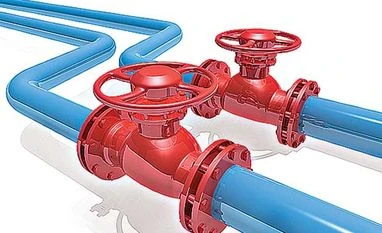"Negotiations are under serious consideration" for a pipeline from Iranian coast via Oman Sea and Indian Ocean to Gujarat, National Iranian Gas Export Co (NIGEC) Managing Director Alireza Kameli said at the World Energy Policy Summit here.
The pipeline is planned to carry 31.5 million standard cubic meters gas per day and will be built in two years from the date of necessary approvals and a gas sale and purchase agreement (GSPA) being signed, he said.
More From This Section
New Delhi has not been participating in talks on the 1,036-km Iran-Pakistan-India gas pipeline since 2007 citing security and commercial concerns but has never officially pulled out of the $7.6 billion project.
Later talking to reporters, Kameli said Iran was currently pursuing only the Iran-Pakistan section of the pipeline.
The pipeline can be extended to India if New Delhi is interested, he said. "If India is interested, we definitely can look at it."
"We welcome India's participation," he said adding for the moment Iran was in negotiations with New Delhi-based South Asia Gas Enterprise Pvt Ltd (SAGE) for construction of an undersea line.
Under the proposal being discussed, SAGE will lay the 1,400-km pipeline bypassing the exclusive economic zone (EEZ) of Pakistan. Any company wanting to buy gas from Iran can use the pipeline for a rent.
"SAGE will not be buying gas from Iran. It will lead an international consortium for building the pipeline," its Director Subhodh Kumar Jain said.
The company will next year conduct a FEED study and tie-up financing. "SBI Caps is advising us on the project," he said.
India and Iran had in 2005 finalised a very attractive price for gas from Iran-Pakistan-India (IPI) pipeline. Iran was to charge 6.3 per cent of the 10-month average of crude oil plus a fixed $1.15 per million British thermal unit. Gas price, according to this formula, would come to $3.67 per mmBtu at current oil price of $40 per barrel.
Iran had in 2009 sought a revision in the indexation to crude oil to 12 per cent while lowering of the fixed component to $1.1 per mmBtu.
Even at the revised formula, the cost of gas would have been $5.9 per mmBtu - less than the price at which LNG is available in spot or current market and half of the price at which India currently imports LNG from Qatar on a long term contract.
Besides, India was also to pay $1.1-1.2 per mBtu in transportation cost and transit fee for wheeling the gas through Pakistan, still making it cheaper than liquefied natural gas (LNG).
India has not pursued the IPI project due to concerns over security of supplies through Pakistan. However, it is pursuing an alternate Turkmenistan-Afghanistan-Pakistan-India (TAPI) pipeline.
Besides security, transportation fee charged by Pakistan was an issue for India. New Delhi, drawing from experience in international pipeline projects, has suggested a transportation tariff of $0.50 per mmBtu while Pakistan wanted $1.57.
Also, Islamabad wanted a transit fee of 10 per cent of the gas price at India border (price payable to Iran plus transportation cost) while India was willing to pay a maximum of 5 per cent of the gas price at Iran-Pakistan border.
Kameli said Iran is the holder of world's largest gas reserves at 34 trillion cubic meters. "Iran will be reliable supplier to anybody willing to buy.
)